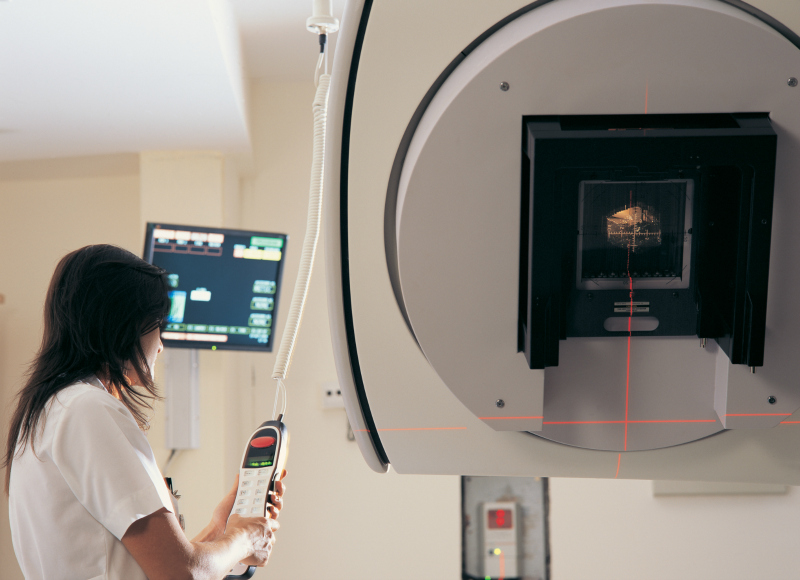Radiation to Penile Bulb Might Result in Severe ED, Study Suggests

Erectile dysfunction (ED) is a common side effect of radiation therapy for prostate cancer. However, new research suggests that avoiding the penile bulb – the base of the penis – during treatment might decrease ED severity.
The study, sponsored by the Institute of Cancer Research (ICR) in London, focused specifically on image-guided radiation therapy (IGRT). This type of therapy uses images of the prostate to help doctors pinpoint exactly where the radiation should be targeted, improving the accuracy of the treatment.
Could aiming for – or avoiding – certain areas affect a man’s erections after treatment? Researchers turned to a larger study on prostate cancer (the CHHiP trial) to learn more.
They looked at data from a subgroup of 182 men who had localized prostate cancer. (Localized means that prostate cancer cells had not spread to other parts of the body.) None of the men had ED before undergoing IGRT. Between 35 and 55 months after treatment, the men completed questionnaires related to their sexual health and erections.
The scientists also wanted to know how much radiation each man had received on his penile bulb. This information was available for 90 men.
Forty-one men from this group had severe ED after IGRT. They also had the highest amounts of radiation directed at the penile bulb.
The findings suggest that avoiding the penile bulb during IGRT would have sexual benefits for men with localized prostate cancer. However, the results need to be validated with more research, the authors said.
“While finding new and better treatments for men with prostate cancer is important, it’s also essential that we find ways of diminishing the side-effects of these treatments,” said researcher David Dearnaley in an ICR news article.
Professor Dearnaley is Professor of Uro-Oncology at the ICR and Consultant Clinical Oncologist at The Royal Mardsen hospital
He added, “Erectile dysfunction can be very distressing for the patients I deal with every day. If doctors can plan radiotherapy treatment so that it avoids the penile bulb – the area at the base of the penis – we may have a real chance of reducing the severity of erectile dysfunction in these patients.”
The study was published in the International Journal of Radiation Oncology in October 2016.
Resources
American Cancer Society
“Radiation therapy for prostate cancer”
(Last revised: March 11, 2016)
http://www.cancer.org/cancer/prostatecancer/detailedguide/prostate-cancer-treating-radiation-therapy
Healthline.com
“Bulb of penis”
(Reviewed: March 31, 2015)
http://www.healthline.com/human-body-maps/bulb-penis
The Institute of Cancer Research
“Avoiding penile bulb with radiotherapy could save men with prostate cancer from harmful side-effects”
(November 28, 2016)
http://www.icr.ac.uk/news-archive/avoiding-penile-bulb-with-radiotherapy-could-save-men-with-prostate-cancer-from-harmful-side-effects
International Journal of Radiation Oncology
Murray, J., et al.
“Effect of Dose and Image Guided Radiation Therapy (IGRT) on Patient-Reported Sexual Function in Prostate Radiation Therapy”
(Full-text. October 1, 2016)
http://www.redjournal.org/article/S0360-3016(16)31533-4/fulltext
Memorial Sloan Kettering Cancer Center
“Image-Guided Radiation Therapy”
(Last updated: April 21, 2016)
https://www.mskcc.org/cancer-care/patient-education/image-guided-radiation-therapy
Prostate Cancer News Today
Fernandes, Joana, PhD
“Prostate Radiation Therapy Induces Changes in Penile Bulb, Causing Erectile Dysfunction”
(December 5, 2016)
https://prostatecancernewstoday.com/2016/12/05/prostate-radiation-therapy-can-cause-erectile-dysfunction-changes-penile-bulb-volume
You may also be interested in...
Other Popular Articles

What Is the Average Penis Size?
If you have ever wondered how your penis compares to others in terms of size, you are not alone. Many men are curious to know how their penises stack up compared to the average. Unfortunately, general curiosity can sometimes give way to full-on obsession and anxiety about penis size. This can be an unhealthy and often unnecessary fixation, especially because most men who think their penises are too small have perfectly normal-sized penises.

What Is Jelqing, and Does It Actually Work?
The term “jelqing” refers to a set of penis stretching exercises that some believe can make the penis bigger. Although the practice has gained attention and popularity in blogs and internet forums in recent years, there is no scientific evidence that it is an effective way to permanently increase the size of one’s penis. In fact, in some cases, jelqing may actually cause damage to the penis, so it is a good idea to get all the facts before setting off to try it.

What Is Sensate Focus and How Does It Work?
Sensate focus is a technique used to improve intimacy and communication between partners around sex, reduce sexual performance anxiety, and shift away from ingrained, goal-oriented sexual patterns that may not be serving a couple.

Can Sex Reduce Menstrual Cramps?
The SMSNA periodically receives and publishes ‘guest editorials.’ The current article was submitted by Mia Barnes, a freelance writer and researcher who specializes in women's health, wellness, and healthy living. She is the Founder and Editor-in-Chief of Body+Mind Magazine.
Having sex while you experience menstrual cramps is healthy and can provide significant benefits. While it might not be the first activity that comes to mind when your PMS or period cramping begins, many people enjoy sex to reduce menstrual cramps, experience increased pleasure and benefit from other advantages. Learn more about having sex while menstrual cramps are happening and how it can help your body.

How Long Does It Take the Average Man to Ejaculate?
On average, it takes a man between 5 to 7 minutes to orgasm and ejaculate during sexual intercourse.

Can Sex Throw off Your Vaginal pH Balance?
The SMSNA periodically receives and publishes ‘guest editorials.’ The current article was submitted by Mia Barnes, a freelance writer and researcher who specializes in women's health, wellness, and healthy living. She is the Founder and Editor-in-Chief of Body+Mind Magazine.
Your vagina is a pretty powerful organ. It is a pathway for menstrual blood and babies. It also is a main player in sexual intercourse. You might hear about your vagina’s pH and worry that yours is at risk. Here’s what to know about vaginal pH, including the impacts sex could have.
You are prohibited from using or uploading content you accessed through this website into external applications, bots, software, or websites, including those using artificial intelligence technologies and infrastructure, including deep learning, machine learning and large language models and generative AI.

